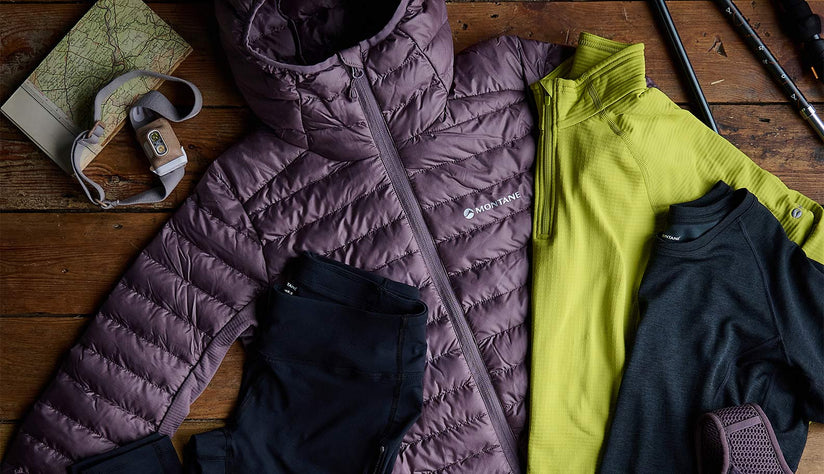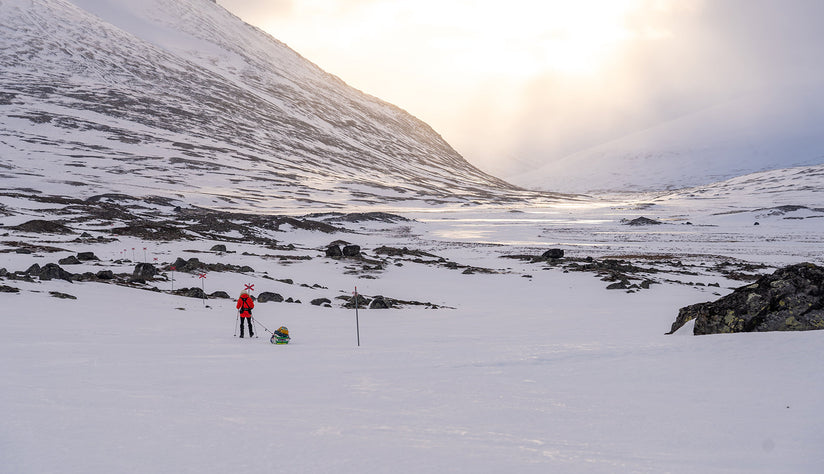Having masterfully conquered some of the world’s most remote and challenging mountain peaks, #TeamMontane mountaineer Malcolm Bass suffered a life-changing stroke in 2020. Keep reading to discover his story of recovery and resilience in the face of his biggest challenge yet.
Meet Malcolm
I’m Malcolm Bass, an NHS clinical psychologist based in North Yorkshire, near Thirsk. From the time I was a student at Leeds University, I began caving and then cave diving, ultimately exploring passages in the Yorkshire Dales in the 1980s and 1990s, where no human had set foot before.
I’d dabbled in climbing and always loved tales of mountaineering and, after a chance meeting in winter with some climbers in the Scottish Highlands, I struck up a friendship with one of them, fellow Yorkshireman Simon Yearsley. This turned into a lifelong climbing partnership. We both loved Scottish winter climbing and later branched out into exploratory Alpinism, venturing to the Himalaya to make the first ascent of the south face of Yogeshwar (6,617m) in 1992 with Julian Clamp and, 20 years later, the first ascent of Dunglung Khangri (6,365m) in the Indian Karakorum, with Paul Figg.
Simon and I also climbed in Alaska. Subsequently I went on to make the first ascent of Zhara/Haizi Shan (5,820m) in Tibet with Patricia Devoll in 2006, the west face of Vasuki Parbat (6,792m) in India with Paul Figg in 2010, and Janhukot (6,805m) in India with Paul Figg and Guy Buckingham in 2018.
Over a 30-year climbing partnership with Simon, we have made dozens of first winter ascents in Scotland, such as Beinn Bhan and Pobble on the remote Lord Reay Seat. Simon and I are still climbing together, albeit now at the climbing wall with adaptations for my post-stroke disabilities.

Malcolm and Paul Figg descending from the summit of Janhukot in 2018. Credit: Guy Buckingham
Why I love to climb mountains
Alpinism inspires me because it’s such an immense challenge and feels like exactly what I was born to do. It’s physically and mentally challenging and I enjoy hard work with good friends in amazing surroundings; it challenges my emotional skills to overcome fear and my intellectual and leadership skills as I research, plan and carry out a trip to some of the most remote parts of the world. Then there’s travelling and climbing with a small group whom you not only have to trust with your life but also put up with sharing a tiny tent with for weeks on end.
It took me a long time to learn how to climb technical routes on high mountains in Alpine style and, in the years before my stroke, it was this aspect of Alpinism that had become most compelling to me as there is so much to learn about the mountain ranges of the world, about technique and equipment and about yourself. I was looking forward to many more years of gradually improving my craft as an Alpinist.
Malcolm’s stroke story
In August 2020 (in the middle of the coronavirus pandemic!) I was enjoying a fantastic long weekend of climbing and hill-running with Simon in the Cairngorms, near where he now lives. There was no warning at all that anything might be wrong, but one morning I woke up at Simon’s house and mysteriously found myself struggling to get out of bed and stand up. I remember floundering into the hall, where Simon’s wife Sarah found me. Simon used the FAST test and thought I’d had a stroke. Next thing I knew I was in an ambulance and wound up in the terrific Ninewells Hospital in Dundee.
Three days later I was in the ICU after my brain swelled and I needed lifesaving surgery. This involved removing a quarter of my skull to relieve the pressure. Meanwhile Donna had rushed up from England and stayed with Simon and Sarah during a touch-and-go week.
After the acute phase of my stroke, I came to and found I had no feeling in or use of the left side of my body. I could talk but I was a bit confused, I had difficulty swallowing and had to eat liquidised food. I’d also lost a quarter of my visual field, and the rest of my vision was blurred.
At first I was in denial about the magnitude of this disability, and I was frantically ringing friends to try to organise climbing trips for the upcoming winter. Once I came out of denial and realised that I’d acquired a very severe disability, I started to feel very miserable. I was in hospital in Dundee and then in Northallerton for four months, before I was finally able to come home in a wheelchair and wearing a surgical helmet (I had surgery to put a porcelain plate in my skull in May 2021).

Malcolm on his Mountain Trike. Credit: Donna James
I still often feel very sad about the aspects of my life that I’ve lost. More surprisingly, I often feel extremely anxious and also, at times, irritable and angry. This is, of course, prompted by my devastating loss but is also a common and involuntary emotional aspect of stroke recovery.
Psychologically, it’s been a grim roller-coaster ride. I’m very glad that I asked for and received excellent psychological and psychiatric treatment to help me adjust to my post-stroke life. I’ve had superb, skilled, kind help from my local neuropsychology department and my local community mental health team.
Since coming out of hospital I’ve been living at home under the loving care of my amazing wife Donna and working really hard at my physical rehabilitation and mental adaptation, while constantly battling the severe and persistent fatigue that occurs in the aftermath of a major stroke.
Rebuilding a life
Now, almost three years on, I continue to make incremental progress. I have no use of my left arm and can’t feel my left leg but have used intense neurophysiotherapy to regain enough motion to enable me to walk a mile outdoors with a stick and I can now walk up and down stairs with a stick and assistance.
I no longer need the wheelchair but I still have absolutely no independence - everyday tasks such as walking around the house on my own, safely having a shower by myself, or cooking a meal, are still beyond me. However, last year I returned to work part time, working remotely and supervising other psychological professionals. The fact that I’m still working makes me feel of some use in the world and retains one facet of my shattered identity.
My friends have been absolutely marvellous and because my climbing mates visit me often and keep in touch regularly, I’m still able to retain some sense of having a foothold in that community. I’m also currently acting as a mentor to the leader of a forthcoming expedition going out to attempt an exciting new Himalayan route this spring.

Malcolm and his partner Donna James, 2022. Credit: Joanna Walters
I’m also still part of the team that evaluates applications and awards grants provided by the Montane Alpine Club Climbing Fund (MACC Fund) and I’m excited to see all the daring expeditions that will be heading out to the mountains next year supported by the relationship between Montane and The Alpine Club.
During my recovery, Donna and I were extremely reluctant to ask anyone for money but close friends nagged us to let them set up a fundraiser, especially when it became clear after a few months that our wonderful NHS was not going to be able to provide physical rehab long term, or some of the specialist physical therapies I now rely on at all.
The #MoveMountainsForMalcolm fundraising campaign is ongoing and it would definitely welcome a boost at this point! It’s funded pieces of kit such as an off-road, one-arm-operated trike but also supports my regular, specialist neuro-physiotherapies that are only available in the private sector but are the key to my continued progress.
Fortunately, all my mental health care has been provided by the NHS. I am enormously grateful for all the generous donations people have made so far, including friends who’ve done sponsored events to benefit the campaign.
Advice for others
For anyone else going through something similar, I’m hesitant to give prescriptive advice because everyone is different, circumstances vary so much, and every stroke is different, as is the care received. But it’s vital that everyone should learn the FAST test. The UK Stroke Association has a page on its website to help people recognise the most common symptoms when someone may be having a stroke:
Facial weakness: Can the person smile? Has their mouth or eye drooped?
Arm weakness: Can the person raise both arms?
Speech problems: Can the person speak clearly and understand what you say?
Time to call 999 (or the emergency number in your country): If you see any of these signs.
Personally, in the aftermath, I’ve found it essential to receive psychological and mental health therapy, as well as physio. Stroke is a hugely traumatic event to go through and we all need help to recover psychologically from traumatic events. As a clinical psychologist I’m familiar with the impact of trauma on the mind and body and I’ve found this knowledge very useful to understand the maelstrom of painful emotions that I’ve experienced since my stroke.
And, physically, before my stroke I trained assiduously for my climbing, thought and read about it carefully and planned and carried out my training thoroughly. I found the resulting slow but steady, incremental progress in my strength, endurance and skills very rewarding. I’ve used this mindset to approach my rehabilitation, taking hope from each little improvement, especially knowing that some functions can come back many years later.

Malcolm and Paul Figg ascending Janhukot. Credit : Guy Buckingham
Meanwhile, I’ve learnt, from the partial loss of it, that my love for the outdoor world is profound and fundamental to who I am. I may not be up a mountain, but the trees and birds in our garden and village still give me great joy and Donna and I, along with our friends, make a point of regularly getting out into the fresh air and countryside.
Looking to the future
In terms of future goals, it was curiosity that first drew me to caving and Alpinism. I read about these activities and wanted to know what it would feel like to do them myself. The progress of stroke recovery is uncertain, no one can predict how much function anyone will or can regain. As a person who’s organised their life around goals and targets I find uncertainty uncomfortable, so I’m trying to use my sense of curiosity to keep me open minded and motivated about where I might end up in the coming years. I think it unlikely that I’ll be climbing again at a high standard, but who knows?
My concrete goals include: regaining the use of my left arm and hand, especially so that I can cook dinner for Donna, something I always loved to do, particularly after a winter weekend in the mountains. I also want to be able to walk without a stick. In January
2022, Simon and I spoke at the Fort William Mountain Festival and I would love to return to the Highlands in winter - but next time get up something!
Support Malcolm
For those inspired by Malcolm’s story and eager to support his rehabilitation and recovery, you can donate to his fundraiser, Move Mountains for Malcolm. For anyone seeking further support on this topic, you can find more information on the Stroke Association website.















